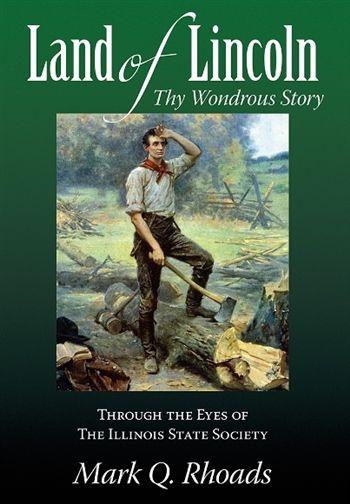If you're a member of the Illinois State Society—Washington's leading and oldest state society—you're going to love Mark Q. Rhoads's book, "Land of Lincoln, Thy Wondrous Story, Through the Eyes of the Illinois State Society," naturally.
The book, published by Jamison Books of Ottawa, Ill., is more or less an anecdotal history of Illinois, after all, by way of the comings and goings and doings, the activities and archival stories of the Illinois State Society. It's big, long and thick—512 pages —and it features a stirring painting of Abraham Lincoln on a green cover, in his up-from-log-cabin, log-busting, visionary wielding an ax incarnation.
I'm from Ohio by Way of Germany and California, but I resisted being put off by all the stories, names, social activities, political tempests in a teapot narrated by Rhoads. Readers should also resist the temptation to view the book as a kind of very localized-—the state of Illinois and the Illinois State Society—saga. It is, but it is also so much more than that.
Rhoads—who is a Lincoln expert, a former two-term Illinois State Senator (like his fellow Illinoian President Barack Obama) and a veteran journalist—brings a particular gift to the task he was set on. He is, you suspect, by nature a joyous story teller, and this book, among its manifold many array of contents is full of good stories. The history of Illinois is replete with bigger-than-life characters: Lincoln, of course, but all the politicians, the artists, the gangsters and shady characters, the men and women who helped forge and populate the state. The biggest character in the book may perforce be the city of Chicago itself, the city that poet Carl Sandburg famously described thusly: "Hog Butcher of the world, Tool Maker, Stacker of Wheat, Player with Railroads and the Nation's Freight Handler; Stormy, husky, brawling, City of the Big Shoulders."
Beyond that, the story of Illinois which streaks naturally, and sometimes not so obviously through this book, is that this story—Illinois being what it is in our imagination—becomes a saga of American history as well.
You get the doings of the Society, writ large and small. You also get the ballyhoo in the background, the scandals, the struggles, the machinations and celebrations of parades, World's Fairs, the White City, Chicago Mayor Anton Cermak and Lincoln and Grant and the Stevenson clan and Wild Bill Hickok (an Illinois native who may have learned how to play poker in his home state before becoming an Old West legend). The history of the group and the state and the politics seem often to merge seamlessly. The presidents have to share space with the Cherry Blossom Queens, the inaugural balls, the names of the scholarship winners and the stories of how the society functions and why it, as do other state societies, functions and what it does.
"I think every state but Rhode Island has one," Rhoads said of state societies. "Basically, they participate in the Cherry Blossom Parade, they put on the inaugural balls, they give scholarships, which may be the most important thing. More than that, by making itself available to Illinois folks who live here—Hill staffers, lobbyists, elected officials, tourists, visitors, and the like—a state society ease the homesickness and make people feel at home in Washington. If the Cubs or White Sox are in town, for instance, why we get fans together and make up a whole section at Nationals Park."
Rhoads served effectively in the Illinois Senate with honor. "My resume says former state senator, not politician," he duly noted, acknowledging some of the more dubious politicians to come out of the state. "We like to use the word colorful. We don't say scalawags."
Rhoads, who lives in Falls Church Va., hails from Hinsdale and Western Springs, Ill., and at one point in his career worked as an assistant to Senate Minority Leader Everett Dirksen, a colorful, intense and mostly beloved Washington figure. "He was giving a speech once, and a heckler kept heckling him," Rhoads recalled. "The heckler said, 'I wouldn't vote for you if you were at St. Peter's pearly gates, to which Dirksen said, 'You couldn't. You'd be from a different district."
If you've had the pleasure of talking with Rhoads, you'd find a man without pretension, garrulous and fully loaded with the gift of gab. Old movies, old politicians, Lincoln and the business of journalism and politics are often tied together. Five minutes in, you're talking about another Illinoian, the late and great television comic George Gobel and his rise to stardom. Or the story might be about McLean Stevenson, (a star of the TV show, "Mash") being asked by talk show host Johnny Carson how he was related to Adlai Stevenson III, then running for governor. "Right now, we're cousins," he said. "But if he wins, he's my brother." I heard that story twice and laughed out loud both times.
"Originally, I was set a challenge to find out if Lincoln was a original member of the Illinois State Society," Rhoads said. "I was never able to verify that, but in the course researching the society archives and histories, I thought that this could be a terrific book, especially for young people."
It's not bad for slightly older people, either. It's the work of a man with an impish, tolerant sense of humor, a keen respect for facts and stories, and for human foibles, especially those that evidenced themselves in the story of Illinois. It is, for sure, a wonderous story.
You need to be a member of Platform® -- The International Platform Association® to add comments!

Comments